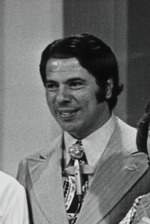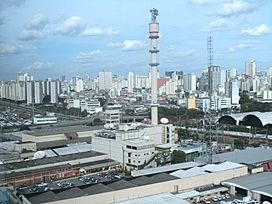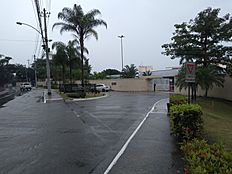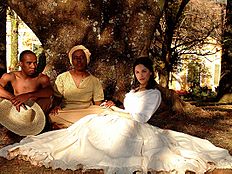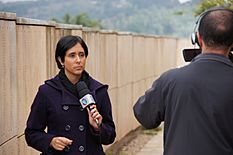RecordTV facts for kids
 |
|
| Type | Free-to-air Commercial broadcasting Television network |
|---|---|
| Country | Brazil |
| Stations | RecordTV Belém RecordTV Brasília RecordTV Cabrália RecordTV Goiás RecordTV Interior RJ RecordTV Interior SP RecordTV Itapoan RecordTV Litoral e Vale RecordTV Manaus RecordTV Minas RecordTV Paulista RecordTV Rio RecordTV Rio Preto RecordTV RS RecordTV São Paulo |
| Affiliates | see List of RecordTV affiliates |
| Headquarters | São Paulo, Brazil |
| Programming | |
| Language(s) | Portuguese |
| Picture format | 1080i HDTV (downscaled to 480i for the SD feed) |
| Ownership | |
| Parent | Grupo Record |
| Key people | Edir Macedo (chairman), Luiz Cláudio Costa (president) |
| Sister channels | RecordTV Internacional Record News |
| History | |
| Launched | 27 September 1953 |
| Founder | Paulo Machado de Carvalho |
| Former names | Rede Record (1990-2016) |
| Availability | |
| Terrestrial | |
| Analog VHF | 07 VHF (Itabuna) |
| Digital terrestrial television |
|
RecordTV (Portuguese: [ʁeˈkɔʁ teˈve]), formerly known as Rede Record, is a Brazilian free-to-air television network. It is currently the second largest commercial TV station in Brazil, and the 28th largest in the 2012 world ranking. In 2010, it was elected by the advertising market as the fifth largest station in the world in revenues and the eighth largest network in physical structure. In June 2021, it ranked second among the most watched channels in the country in the National Television Panel, behind only TV Globo.
As the main member of the media company Grupo Record, the network is headquartered in São Paulo, where most of its programming is also generated at the Dermeval Gonçalves Theater, and has a branch in Rio de Janeiro, where its telenovelas and other formats are produced at the Casablanca Estúdios (RecNov) complex. Its national coverage is achieved by retransmission from 111 stations, 15 of which are owned by the company and 96 of which are affiliate stations.
The station was inaugurated in the city of São Paulo on September 27, 1953, by businessman Paulo Machado de Carvalho, owner until then of a radio conglomerate, through a concession obtained in November 1950, the year television was launched in Brazil. TV Record was the fourth station to operate in the country after TV Tupi São Paulo (1950), TV Tupi Rio de Janeiro (1951) and TV Paulista (1952).
During the 1960s, the channel became popular, even leading in audience, with the exhibition of music festivals such as MPB and Jovem Guarda. In this period, Record headed the Rede de Emissoras Independentes (REI), a chain that integrated stations from various locations in Brazil. In the 1970s, the businessman and TV host Silvio Santos acquired half of the channel's shares through a partnership with Machado de Carvalho. In 1989, Record, after being under unfavorable financial situation in the second half of that decade, was sold to Bishop Edir Macedo, founder and leader of the Universal Church of the Kingdom of God.
The new acquisition spurred major investments in the structure of the station, which in the 1990s formed its national network with purchases of channels and affiliations, resulting in its positioning, from 2007 to 2015, as the country's second largest network in audience and revenues until it was overtaken by SBT. As of 2012, both stations began to intensely dispute point tenths and take turns in the IBOPE ranking.
Contents
History
Background
Only two months after the arrival of television in Brazil, businessman and communicator Paulo Machado de Carvalho got a permit to operate a new TV channel in the city of São Paulo on November 22, 1950, being granted channel 7 paulistano. At the time, Paulo and his family already owned a large conglomerate of radio stations and took advantage of the name of his then Rádio Sociedade Record to baptize his first television channel; it was decided that the new station would be called TV Record.
To set up the station, modern equipment was provided from the United States that was installed in its studios on Miruna Avenue, in the Moema neighborhood, South Zone of São Paulo. Before going on the air, the channel made some experimental broadcasts months before its inauguration, showing the choir of the Escola Normal Caetano de Campos and the orchestra of the São Paulo Public Force.
Launch and first years
The channel went on air on September 27, 1953, at 8:53 pm. In the first image to be shown by the station, the artist couple Blota Júnior and Sônia Ribeiro descended a staircase and announced the launch of Record. After Blota made a speech, a show started with Dorival Caymmi, Inezita Barroso, Adoniran Barbosa, Isaura Garcia, Pagano Sobrinho, Randal Juliano, Enrico Simonetti's orchestra and several dancers. This musical attraction was presented by Sandra Amaral and Hélio Ansaldo.
In its early operations, the station aired musical (among which, with celebrities such as Nat King Cole, Charles Aznavour, Ella Fitzgerald and Marlene Dietrich), sports, theater, humorous and informative programs. In 1954, the first serial produced in Brazil, Capitão 7, starring Ayres Campos and Idalina de Oliveira, went on the air, remaining until 1966. In 1954, the program Mesa Redonda was created, hosted by Geraldo José de Almeida and Raul Tabajara. In 1955, Grande Gincana Kibon went on the air, being presented for sixteen years.
1959-67: Emissoras Unidas
Early growth
With the rapid growth of his new media vehicle, Paulo Machado de Carvalho joined his brother-in-law João Batista do Amaral to establish a partnership between São Paulo's TV Record and Rio's TV Rio (then channel 13 in Rio de Janeiro), originating the Rede Unidas de Televisão (or Rede das Emissoras Unidas). With the creation of the new network, a link was built between the cities of Rio de Janeiro and São Paulo that allowed the connection via UHF signal between Record and TV Rio. It was through this link that TV Record broadcast the Brazilian Turf Grand Prix, directly from the Jockey Club in Rio de Janeiro; the link between the two stations also made it possible to exchange productions between them. With this, Emissoras Unidas would get affiliates and retransmissions throughout Brazil under the leadership of the headquarters of TVs Rio and Record.
Regular programming and pioneering in Brazilian television
In 1958, the first regular program produced by Record and TV Rio was launched, Show 713, an attraction in which the screen was divided in half, with each side belonging to each station. The program featured interviews, news reports and musical numbers from the two stations' hometowns. Record ended the 1950s by inaugurating its Teatro Record on Rua da Consolação, which would later be used for musical presentations and program recordings.
The station entered the 1960s by pioneering the inauguration of the new federal capital Brasilia, becoming the only TV station outside the new city to broadcast the event, which included interviews with several Brazilian politicians at the time, including then-president Juscelino Kubitschek.
Fires and prestiged attractions
The station's headquarters in Moema would come to suffer a fire in May 1960, causing Rede Unidas to air more attractions from the co-generator TV Rio while Record recovered. It was the first of a series of six fires that Machado de Carvalho family's channel would face, the most serious being in July 1966, where several reels of archival tapes were lost. Despite these bad times, the station managed to achieve great prestige by showing several attractions during the 1960s, especially music programs such as O Fino da Bossa and the classic MPB Festivals where several renowned artists such as Gilberto Gil, Caetano Veloso, Chico Buarque, Elis Regina, among others, performed amidst the strong military dictatorship in the country.
Competition
With the emergence of TV Globo and the growth of its rival TV Tupi, Record sees its audience gradually decrease. However, the station was able to launch a few more audience hits, such as Família Trapo with Ronald Golias and Jô Soares, and the news program Repórter Esso. The Teatro Record in Consolação suffers a fire that forces Record to transfer the São Paulo headquarters to Augusta Street, closer to downtown São Paulo.
1969-89: Decline
The founding of REI and the participation of Silvio Santos
Due to disagreements between the directors of TV Rio and Record (because the Rio de Janeiro channel had acquired productions from Tupi, which was then a rival of the Machado de Carvalho family station), the Emissoras Unidas was extinguished in 1967. Later, however, the two stations reconnected and founded the Rede de Emissoras Independentes, which became known by the acronym REI. Immediately after this, businessman Silvio Santos acquires half of Record and uses it to show some of his programs (since the entertainer had lost space on other television channels). Despite initially not agreeing, the former owners of Record end up accepting the agreement for Silvio to co-operate the station.
By this time, TV Record had considerably lost its audience to TV Tupi, Rede Globo, and the recently established Rede Bandeirantes, owned by João Saad. Shortly afterwards, TV Rio was disconnected from the Emissoras Independentes, leaving REI with only Record as its sole channel. REI would later broadcast the 1970 FIFA World Cup directly from Mexico, marking the first World Cup to be transmitted by Record. The channel also brings its casts of artists, particularly the famous comedian and animator, Chacrinha.
However, due to the decline that was gradually affecting Record, the channel decided to sell its theater in Rua Augusta in downtown São Paulo. Meanwhile, Silvio Santos inaugurates a new TV channel in Rio de Janeiro called TVS and starts to exchange productions of this channel with Record, ending with the simulcast premiere of Programa Silvio Santos on TVS and Tupi in 1976 ending a 10-year stinct with Globo. In 1978, Paulo Machado de Carvalho acquired concessions to operate two more television channels for TV Record: channel 4 in Franca and channel 7 in São José do Rio Preto, making it a statewide network. Two years later, with Tupi's shutdown, Programa Silvio Santos, by now produced in Sao Paulo, moved to Record.
Concessions and the departure of Santos
Silvio Santos won some concessions from the former broadcaster from the federal government and founded his own television network, SBT, in 1981, on part of the former Rede Tupi stations and studios. The businessman and entertainer, together with Paulo Machado, starts managing channel 9 in Rio de Janeiro (which had also won the bidding process), which was transformed into TV Record Rio de Janeiro in 1982, becoming the channel's fourth TV station (since the other two stations in the countryside of the state already existed, besides the headquarters in São Paulo). Both stations belonged to the now relapsed Rede de Emissoras Independentes, which until then had a very low audience. It was the channel's next attempt to go national.
After SBT was founded, in 1981, TV Record São Paulo became a second plan for Silvio Santos, but the Machado de Carvalho family, co-owners of the channel, insisted on investing in the small station. In 1983, the program Especial Sertanejo premiered hosted by Marcelo Costa promoting Brazilian country music while journalism remained the station's flagship with the premiere of Jornal da Noite, which scored a victory for the network with a 2-hour broadcast nationwide - more than the competition. In 1985, SBT was nationally consolidated when it debuted its national network programming via satellite for all of Brazil, through Brasilsat, Embratel's exclusive channel. In 1986, Record broadcast its second World Cup in a pool with SBT directly from Mexico. In 1987, at the same time that Programa Silvio Santos stopped being shown on Record (and started being shown only by SBT), Silvio Santos stopped injecting 70% to 80% of his participation in TV Record of São Paulo, and thus forced the Machados, thru Paulo, to give up Channel 9, which later rebranded to TV Copacabana with a tourism approach.
The end of REI and ostracism
In the year 1989, the then-Rede de Emissoras Independentes that still continued to be led by TV Record de São Paulo succumbs to its crisis and is extinguished. With this, the channel fell into ostracism and Record became a local station again, leaving only the station in São Paulo and the other two in the interior of the state, since channel 9 in Rio de Janeiro had become TV Corcovado, which would later be owned by CNT to become CNT Rio de Janeiro.
Sale to Edir Macedo
With Record already suffering a serious crisis and on the verge of bankruptcy, Silvio Santos convinces Paulo Machado de Carvalho to put the station up for sale. Until that time, besides the very low audience, the channel had annual revenues of $2.5 million, but had debts that exceeded $20 million.
Soon after learning about the sale of the channel, the leader of the UCKG, Edir Macedo, became interested in buying Rede Record. At the time, he was in the United States and learned about the sale of the station from his lawyer Paulo Roberto Guimarães. Macedo appointed pastor Laprovita Vieira to be the intermediary of the purchase of Record. Laprovita had a meeting with Demerval Gonçalves, representative of Silvio Santos and Paulo Machado de Carvalho, at the station's old headquarters in the Moema district of São Paulo; the negotiation was quick. Besides TV Record, Edir Macedo also acquired Rádio Record, which, like the television channel, was in bad shape and also belonged to Machado de Carvalho's family and to Grupo Silvio Santos.
A meeting was held with lawyers from both parties, which was attended by Laprovita, Edir, Silvio Santos and his partner Paulo Machado de Carvalho. The requested amount was accepted by both parties, both Edir Macedo and Silvio Santos' representative. Days later, Silvio Santos regretted the sale, but he was aware of Record's precarious situation and had no other way out, since both he and Paulo Machado de Carvalho were still unable to pay Record's debts. Some creditors threatened to file for bankruptcy for the chaotic situation the channel was in.
After the sale, it was rumored that Record would become a channel with completely religious programming which would be used by UCKG, founded by Edir Macedo. However, this did not actually happen, but until today, the station shows some evangelical programs, especially in the early morning hours. The new directors of the station after the purchase, together with Macedo, decided to continue the station's commercial activities.
The deal led to the creation of Central Record de Comunicação (now Grupo Record) in 1989, which became the main media conglomerate controlled by Macedo himself, which today includes, besides RecordTV and Rádio Record, the portal R7, Record Entretenimento, and later Record News.
1990-2007: Growth and investment
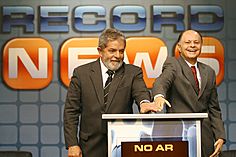
Restructuring
After its sale, TV Record went through drastic changes: a new visual identity was presented in July 1990 and a reformulation in its programs that managed to recover its lost audience. The station started its national expansion when it began transmitting its signal via the BrasilSat A2 satellite, also distributing its programming to satellite dishes. The channel became Rede Record and began to acquire its own stations, affiliates and retransmitters for renewed expansion. In 1992, Record finally resumed broadcasts to Rio de Janeiro for the first time since 1986-87.
In 1995, the station moved to its current headquarters in Barra Funda by acquiring the CBI Studios, which was very modern for its time. During this period, the company hired several artists to fill its programming grid, with several artists such as Eliana, Raul Gil, Gilberto Barros, Ratinho, Milton Neves and others becoming famous. Record was able to reach third place in the national audience, surpassing Band and the struggling Rede Manchete.
New slogan and further expansion
In 2004, the network decided to bet on a new phase aiming for more ratings. With the slogan On the way to leadership, Record begins to expand its attractions by producing renowned programs, new vignettes, and telenovelas that became popular. Among the successes of this new phase, the productions A Escrava Isaura, Prova de Amor, Vidas Opostas and Caminhos do Coração (which was divided into three seasons due to its huge audience) stand out.
On September 27, 2007, Record News, the first free-to-air news channel on Brazilian television, was inaugurated, occupying the signal of the former Rede Mulher, though it was already owned by Grupo Record 13 years prior. On the day of the foundation of Record News, the governor of the state of São Paulo José Serra, the mayor of the city of São Paulo Gilberto Kassab, the then president of Record Alexandre Raposo, the owner Edir Macedo and the president of the Republic Luiz Inácio Lula da Silva were present. The inauguration ceremony of the new channel was broadcast by Rede Record inside Jornal da Record, as well as Record News itself.
Competition with Globo and SBT
In 2007, Rede Record was able to overtake SBT to become the second largest Brazilian television station, only remaining behind Rede Globo. However, in some programs, it was able to overtake Globo. In cities such as Goiânia, Belém, and Fortaleza, its news magazine, Domingo Espectacular, surpassed Rede Globo's Fantástico, and Record's morning news program, Fala Brasil, was able to surpass Bom Dia Brasil in São Paulo. On December 11, 2009, Record managed to top first place in Rio during the broadcast of The Elite Squad.
2010-15: Redesign
Helicopter crash and rescue
In early 2010, a RecordTV helicopter crashed inside the Jockey Club in São Paulo after suffering a breakdown. The aircraft was in that region to cover a robbery that had occurred in the Morumbi neighborhood, South Zone of São Paulo. The pilot of the helicopter, Rafael Delgado Sobrinho, died on the spot and cameraman Alexandre Silva de Moura "Borracha" was taken in serious condition to hospital; the two occupants were rescued by Globocop from TV Globo. Rede Record lamented the incident at the time and closed that night's Jornal da Record quietly with a moment of silence in honor of their deceased colleagues.
Olympic broadcast
In 2012, Record exclusively broadcast the 2012 Olympic Games in London and the unprecedented 2010 Winter Olympics in Vancouver. It was the first time that its rival Rede Globo was left out of the Olympics, though them and Rede Record, along with Rede Bandeirantes, would broadcast the Summer Olympics in 2016.
Reformulation and loss to SBT
In 2013, Record underwent a reformulation, which eventually resulted in the change of the broadcaster's top command. Alexandre Raposo was eventually fired and in his place Luiz Cláudio Costa came from TV Record Brasília to the position of president. Another important change in command was that of Honorilton Gonçalves, by Marcelo Silva in the position of vice president of Record. After spending 2012 without much profitability, the company hired a consulting service to reformulate its market strategies.
In 2014, SBT (which always held the second place position in Brazilian television until 2007) was able to take back second place, which shrunk Rede Record's position down to third place for the first time since 2007. However, Rede Record managed to keep its position as one of the top three Brazilian television networks.
2016-present: Rebranding and current affairs
To mark a repositioning of the brand, Rede Record, on the night of November 24, 2016, during the broadcast of Jornal da Record, presented to the public its new visual identity. The news program showed a report on the change in the brand and the station's slogan, which is now "Reinventing is our brand". The station's name was also changed to RecordTV. The change occurs to consolidate RecordTV's image as an avant-garde and multiplatform station, linked to the television of the future and to reaffirm that its performance goes beyond the borders of Brazil and reaches more than 150 countries with its signal. In addition, products such as soap operas and miniseries are exported to countries on all continents.
Teledramaturgy
Telenovelas
The first telenovela produced and aired by Record was the 1954 novella A Muralha. Between 1954 and 1977, the channel had produced seventy-eight telenovelas. In this first period, still in the era of Silvio Santos and Paulo Machado de Carvalho, the highlights were Os Deuses Estão Mortos and As Pupilas do Senhor Reitor, the latter being, according to Unicamp, the soap opera with the highest audience in Record's history. The last production of the network in this first phase was Meu Adorável Mendigo of 1974, a plot that closed the teledramaturgy core in the network, which was dismantled and the professionals dismissed after this period. In 1977, however, the network aired O Espantalho, a partnership with Ivani Ribeiro, who had started at the channel in 1954. Between 1999 and 2004, eight additional telenovelas were unassumingly produced, originating from Record's partnerships with independent companies.
On May 10, 2004, Herval Rossano was hired as general director of teledramaturgy and began to guide the network in restructuring, promoting investment in the purchase of state-of-the-art equipment, new studios and expansion of the team, in addition to the acquisition of a cast of rising authors and new qualified actors. The director presented the proposal of seven plots by different authors before the choice of which one would restart dramaturgy at the network was made. Besides the debut telenovela of this new phase, A Escrava Isaura, several other productions stood out, such as Vidas Opostas, Prova de Amor, Amor e Intrigas, Chamas da Vida and Caminhos do Coração.
In 2015, the plot Os Dez Mandamentos, the first biblical telenovela of the network and of Brazil, was produced. Os Dez Mandamentos was an immediate success and made history in Brazilian television. With the soap opera, the network broke an audience record by surpassing Globo's main soap opera for the first time in 40 years. With the success of the soap opera, Record TV decided in October 2015 that the 8:30 PM time slot would be dedicated only to biblical productions. The soap opera was also broadcast in several countries (such as in Argentina by Telefe).
On January 19, 2021, with the launch of the soap opera Gênesis, Record managed to beat its competitor in two capitals and make one of the most followed productions in the world.
On the morning of October 8, 2022, Record was the subject of a ransomware attack affecting many of the broadcaster's systems. The attack led to a disruption of programming, with its Saturday morning program Fala Brasil replaced by reruns of Everybody Hates Chris until operations were restored. SBT and TV Cultura had also faced ransomware attacks the same day.
Miniseries and series
Record TV has so far aired more than 20 series, serials and miniseries in its different phases, since the 1950s. Also, since the restart of the network's teledramaturgy core in October 2004, besides telenovelas, some series and miniseries have been produced, mostly with a biblical or police theme.
Programs
Revenue
According to Rede Record's vice president, in 2010, Rede Record had revenues of 2.7 billion reais, exactly 25% more than in 2009. In 2011, the network had revenues of 3.5 billion reais, and 1.72 billion reais in 2012.
Coverage
RecordTV currently has 15 owned-and-operated stations and 96 affiliated stations, for a total of 111 stations. It was one of the pioneers of digital television in Brazil.
International coverage
Created in 2002, Record Internacional is present in 150 countries and carries programs that are successful in Brazil. Record Internacional contains six channels that carry a digital signal around the world, and 17 stations. The station is also an affiliate of CNN International.
In Africa, RecordTV broadcasts to Mozambique, Uganda, Cape Verde, Guinea-Bissau and Madagascar. In Mozambique, TV Miramar, which is part of Record International, has 10 stations and has several local programs, which were successful. Additionally, the station also broadcasts to all of Asia, and this coverage is done by two satellites: Asiasat 2 and JSAT.
In the United States, coverage is provided by the NSS-806 and EchoStar satellites and is distributed by Comcast and the Dish Network. In Europe, RecordTV is the only Brazilian television channel available without any subscription fees. Coverage reaches all countries on the continent.
Awards
ExxonMobil Journalism Award
- 2005: Esso Special for Telejournalism, granted to Leandro Cipoloni, Antonio Chastinet, Steve Ribeiro, Luiz Mendes and Paulo Nicolau, for the report "Imbroglione - The Phantom Citizen".
- 2008: Esso Special of Telejournalism, awarded to André Felipe Tal, Ricardo Andreoni, Jorge Valente and Marcelo Zanini, for the report "Dossiê Roraíma: Pedofilia no Poder"
- 2020: King of Spain, awarded for the third time to the broadcaster, but this time for the report "A Besta", from Câmera Record.
See also
 In Spanish: RecordTV para niños
In Spanish: RecordTV para niños




